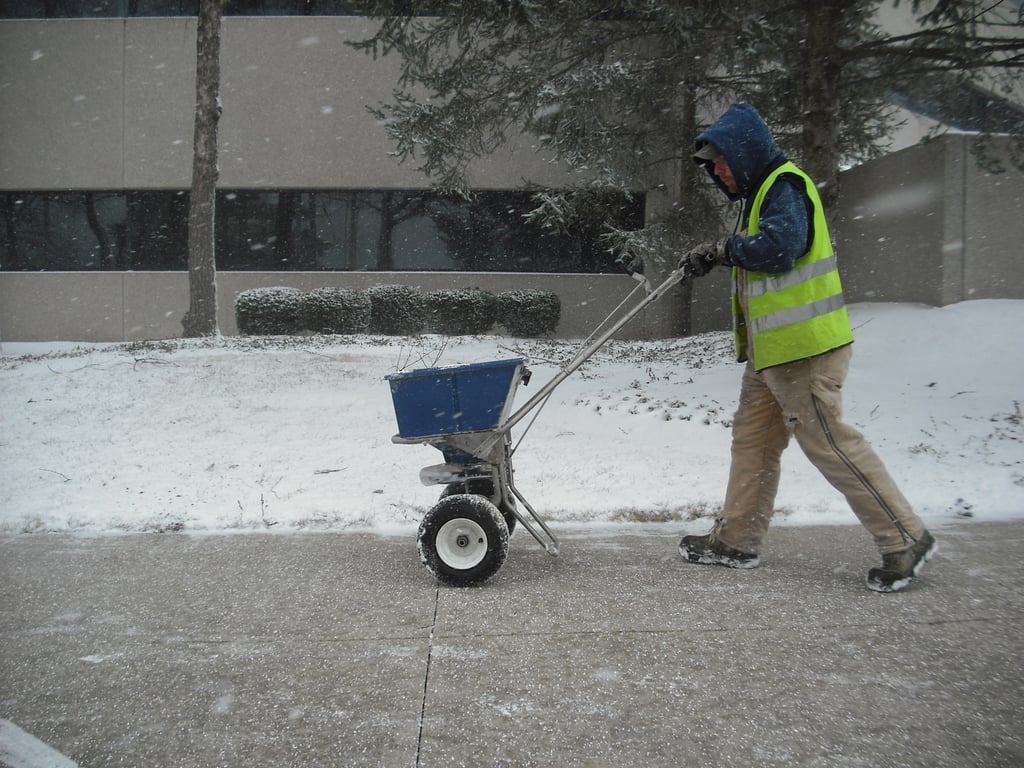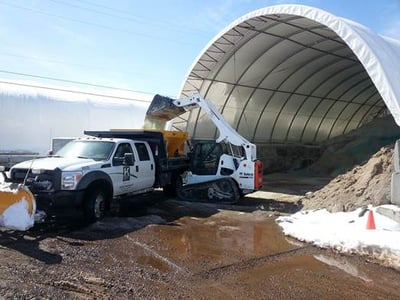What is the best ice melt agent to use on your Central Kentucky property? Like many property managers, you might be wondering about the best ice melt products for your grounds. Perhaps you’ve been burned (literally) in the past by salt-induced damage to turf, plants or pavement. Or, maybe you simply want the safest product that will cause the least environmental impact without breaking your budget.
Safety, budget, and damage are the three key factors to consider when making a decision about which ice melt product is best for your situation. But first, you should know which ice melt products are available, how they work, where they work, and under what conditions they are most effective.
 Following is a round-up of the five best ice melt agents that we recommend for various surfaces to keep your grounds safe.
Following is a round-up of the five best ice melt agents that we recommend for various surfaces to keep your grounds safe.
Best Ice Melt for Asphalt
Sodium chloride (applied by large spreaders on trucks) is the most cost-effective ice melt solution, and its versatility allows it to be used on all asphalt and gravel surfaces. In fact, you’ll see no chemical corrosion on asphalt when using sodium chloride. It is also inexpensive, effective to zero degrees (high application rates, 18 to 0 degree). Caution: sodium chloride is not recommended for concrete surfaces because it will corrode concrete.
The Bottom Line: Sodium chloride is the best ice melt for asphalt and it is easy to handle when treating large areas.
Best Ice Melt for Concrete
Potassium chloride (applied by small walk behind pushers) ice melt is the most affordable product for concrete surfaces, and it is effective in temperatures down to 18 degrees. It is also safe for plants and turf.
The Bottom Line: If your property has concrete sidewalks, walkways and common areas, this product is a great fit.
Best Ice Melts In Sub-Zero Temperatures
Calcium chloride is effective to -65 degrees, but will refreeze quickly. A word of caution with calcium chloride: It can leave a greasy residue, creates extreme heat and will cause corrosive damage on asphalt and concrete. However, it is priced in the mid-range, making it a reasonable option for the coldest winter days on some asphalt surfaces. Another option is magnesium chloride, which is effective to -10 degrees but also refreezes quickly. It can cause corrosive damage on asphalt and concrete, as well.
The Bottom Line: Calcium chloride and magnesium chloride are the best ice melt performers in sub-zero temperatures. However, property managers need to anticipate some damage to their paving surfaces when using these products.

Enhance Safety With Sand
While sand is not an ice melt product, per se, it can provide traction in sub-zero temperatures, thereby increasing safety.
The Bottom Line: Sand is a cost-effective product that is safe for plants and can be added to your snow and ice management program.
Keep Your Property Clear and Safe This Winter
Prepare for the first snowfall by selecting ice melt agents that are safe for your property, will not cause corrosive damage, and fit into your winter landscape services budget. There is an ice melt solution for your Kentucky commercial property. Call us any time in Lexington at 859-254-0762 and Louisville at 502-264-0127. Or, fill out this simple form to request a proposal.


